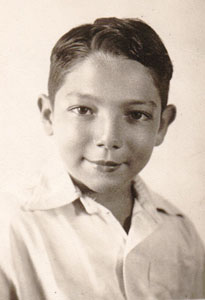Michael Dana
My story, such as it is, has neither daring adventures nor narrow escapes. It is just the story of one who was part of the end of a phase of Jewish history that was about 3500 years old. The First Exodus was voluntary – Jews seeking a better life free from oppression. The Second Exodus (1947 to 1957) was not voluntary but a matter of survival. Most did not want to leave. Many were descendants of Jews who had lived in Egypt for many generations ranging from a few decades to several centuries.
My story begins in the early 1800’s with my great grandparents (perhaps even earlier). Both my grandfathers were born in Egypt. So were my grandmothers, their children and grandchildren. So were my uncles, aunts, and myriad cousins. Now, none live there any more. Except for a few dozen elderly Jews left, the 80,000 strong Jewish community lives dispersed among several countries.
I was born in 1935. My first memories are of World War II. The great concerns my parents had when the German Army was just outside Alexandria. I remember their desperation and helplessness knowing even then that a German occupation, welcomed by many Egyptians, would mean the deportation and extermination of Jews in Egypt. Egyptians were seeking the end of the British influence in Egypt and expected the Germans to aid them in that goal. Periods of anti Semitism in Egypt had previously taken place, and a new period began as the war progressed. It grew worse in 1945, worse still in 1947 when Egypt sent soldiers to defeat the Jews in Palestine, and later, when Egypt and the other Arab countries lost; also in 1948 when the State of Israel was officially declared. I remember many street demonstrations threatening Jews and Zionists, and street thugs beating up European and Jewish pedestrians.
During this period two Egyptian employment laws were passed which resulted in Jews losing their jobs and their businesses. One of my uncles, a lawyer, lost his practice and emigrated with his family to Uruguay, and another who lost his job, could not find another, and took his family to Israel, where he was able to make ends meet. This was a fairly typical situation for many Jews. Worse still were the accusations of spying, which resulted in the arrest followed by deportation of many other Jews. The various Jewish agencies performed miracles in aiding Jews to travel and be resettled in other countries.
My father died in 1945 and did not have to face the worsening conditions from that year onwards that eventually lead to my family’s expulsion from Egypt in 1956. My mother managed to continue to keep me in school until 1951. At that time I was able to leave for England as a student. Many bank accounts were frozen, and foreign currency exchanges denied. Luckily, as a student, I was allowed to transfer enough funds to pay for my schooling for the next three years. Whatever was left stayed in Egypt.
Less lucky was my sister. She lived in Alexandria. Her husband and his father owned a family mercantile business. After 1948 it had declined, but was still operating. In 1956 my sister and her very sick husband, and all her husband’s family, had the business confiscated and they were ordered to leave the country in 3 weeks. They basically had to leave all their assets behind and leave the country with a few suitcases. They traveled to France. My sister’s husband died a few days later.
At the age of 16 I became a student of textile technology and engineering in Bradford, Yorkshire. I lived there without any family; my nearest uncle lived in Milan, another one lived in New York, my mother by then had moved to Argentina, and my sister was still living in Egypt. I was lucky in many ways: I liked my college courses, finding them interesting and easy. I made many British friends who, in their several ways, tried and succeeded in making me feel at home. 1951 was a period when Britain was still in the process of recovering from a very costly World War II. The textile industry too was going through many changes: the traditional wool and worsted fabrics were beginning to be replaced by synthetic fibers. Many under-developed countries were beginning to compete with Britain, and the British mills, busy during the war, were now beginning to feel the pressure.
It became clear later that my chosen profession was entering the start of a long decline. After college, the research division of a major textile machinery manufacturing company employed me. Ironically much of the machinery made was going to the under-developed countries – an early lesson in global economics.
This job and my next one involved a lot of travel to many parts of the world, including Israel. In the 1960’s Israel was building its industrial base, textiles being one major industry, which was able to provide many jobs for new immigrants. With a wife and three small children, we moved to Israel. My work was directly involved with textile production. Life in Israel at that time was spiritually and emotionally satisfying, but hard for many trying to work while learning the language as adult immigrants. Children fared a lot better. My three children became quite fluent in Hebrew in a matter of months, while my wife and I struggled to learn our first “thousand words.” Difficulties at work made me go back to Britain. I worked for an engineering company that was soon after purchased by an American company. Within a few months I found myself transferred to North Carolina – a state with a large textile industry.
I must say that coming to the US, unexpected as that was, turned out to be one of the best things that ever happened to me. Right from the start, it felt as if I had reached the “home” which I had never quite had before. The entrepreneurial spirit I encountered was one I had never seen before. This feeling has never left me: to him who tries, everything is possible!
The fate of the textile industry is well known. What had happened in Britain was now happening in the US. Textile mills were – and still are – closing, with the industry going to newly industrializing countries. After about 12 years in textiles in the US I left the industry. Some 30 years ago I made a career change: after much thought I chose employment in the financial industry as a very new financial advisor. Only in America can a 42 year old make such a career leap and find employers willing to take the risk! So now, recently retired after a 29-year career with Merrill Lynch, I have time to muse on life’s events since the days of this second Exodus. These events are not unusual. They are fairly typical of how one Jewish family left Egypt and survived.
For the many who left, there are many stories: about the countries that received us; about the suffering of the older Jews among us who had difficulties adapting to new languages and cultures, who lived the rest of their days with sorrow, bitterness and regret. These older Jews are now mostly dead. There are many stories about the adaptability of the younger Jews among us who built ourselves new lives, identities and cultures. These new Jewish families live! Their children live!




